commentary Commentary
Commentary: Have we seen the end of Man Utd fans’ wrath?
Fans of big clubs in England, ignored for so long by rich and remote owners, have suddenly found their voice, says writer John Duerden.
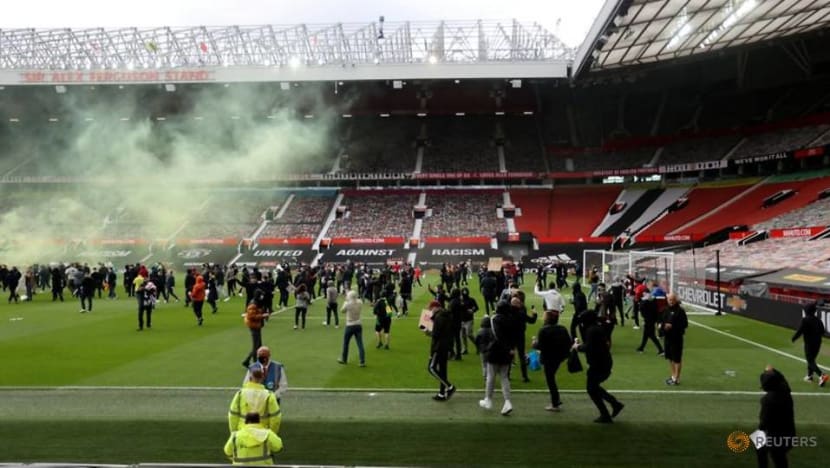
Manchester United fans on the pitch in protest against their owners before the match. (Photo: Action Images via REUTERS/Carl Recine)
SINGAPORE: A month ago, the main issues in English football were when fans would be allowed back in stadiums, what is behind Liverpool’s decline and which players national team coach Gareth Southgate should select for the delayed 2020 European Championships this summer.
Much has changed since and suddenly fans of big clubs in England, ignored for so long by rich and remote owners, have finally found their voice. Now they need to decide what to do with it and if they have any chance of bringing about real change.
On Sunday (May 2), as many as a thousand Manchester United fans stormed their home stadium Old Trafford and prevented the English Premier League (EPL) game against bitter rivals Liverpool from taking place.
Usually, there would have been universal condemnation of the fans’ actions, but there seems to be strong support for their actions.
PUBLIC SYMPATHY
Their actions stem from years of disillusionment of Manchester United fans at their owners, the Glazer family who took control of the club in 2005.
Since then, the Florida-based family have reportedly taken as much as £89 million (US$123.6 million) out of the club and into their own pockets and loaded massive debts onto one of the most popular sporting institutions in the world.
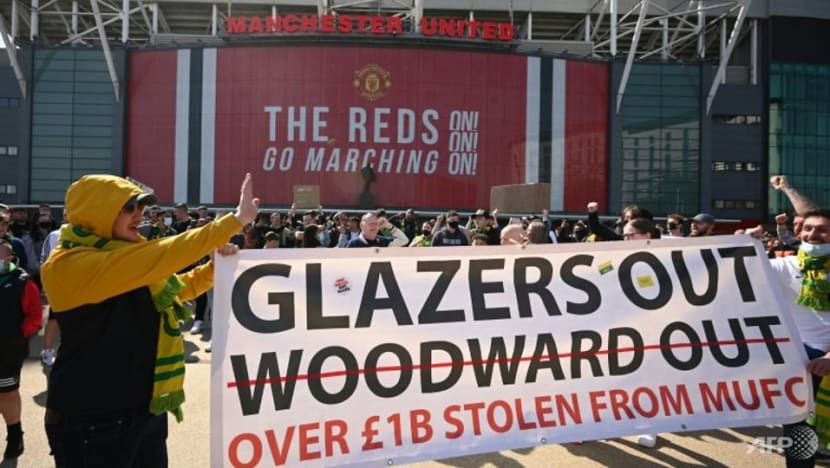
Gary Neville, former Manchester United star and leading media pundit supported the protests. "The reason why those thousands and thousands of fans came today is because they have had enough. They have had enough."
Former United captain Roy Keane agreed.
“They’re doing it because they love the club. Some people won’t agree with it, but sometimes you have to put a marker down for people to take notice. This will go out all over the world and hopefully the owners of Manchester United will sit up and take note. These fans are deadly serious and this is just the start of it from United fans, I can guarantee you.”
READ: Commentary: Super League was the last straw for football fans
READ: Commentary: This new Super League will break football’s essential promise
While the owners have been unpopular for years, the catalyst for Sunday’s protest was the recent European Super League (ESL) fiasco of which Manchester United played a leading part with Joel Glazer, United’s co-chairman, as vice-chairman of the proposed competition.
On Apr 18, 12 of Europe’s biggest clubs, six in England and three each from Italy and Spain, announced they were leaving the UEFA Champions League to start their own midweek competition which they would always be guaranteed a place in.
Criticism around Europe was swift and fierce and within 48 hours of its official announcement, the new project had died, with protests at Chelsea, ahead of a EPL game against Brighton, causing that club to withdraw and others to swiftly follow suit.
FANS FINALLY WAKE UP
The Chelsea protests meant that England was at the centre of the opposition against the ESL. There was condemnation in Italy and Spain, but fans did not take to the streets.
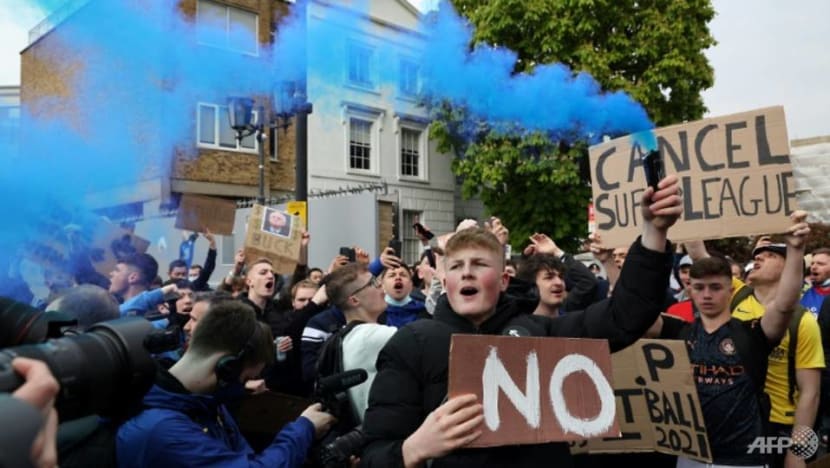
In England the reaction was stronger with the media, fans, ex-players, other clubs and even Prime Minister Boris Johnson and other politicians quick to criticise the plan.
For years, there has been disquiet in the country about football’s laissez-faire approach to allowing almost any owner from anywhere to buy England’s clubs which have, historically, played a central role in local communities.
A club’s relationship with its local community has been an integral component of its history and heritage and not only cultivates a strong supporter base but also helps uplift the town and city it is based in.
In this way, it is much more than a football club – it forms a useful anchor for societal cohesion, economic development and social role-modelling.
The Football Association does have a so-called “fit and proper test” to check if prospective owners and directors are “appropriate people” to be involved with football clubs.
READ: Commentary: The English Premier League and European football have a disgusting racism problem
READ: Commentary: Johor crown prince could take Valencia in the right direction
However, the test merely checks on whether potential owners have filed for bankruptcy in the past, if they have an interest in another football club and if they have any legal impediments in taking over.
These tests do not guarantee that a prospective buyer is going to be vested in the local community.
As these foreign owners globalised the football clubs they owned, the fan in Abu Dhabi or Beijing with deeper pockets and greater merchandise-buying power mattered more than the local lad in Manchester or Merseyside.
Fans at the big clubs have complained that the owners are remote, out of touch and interested only in money - claims that were reinforced by the ESL saga.
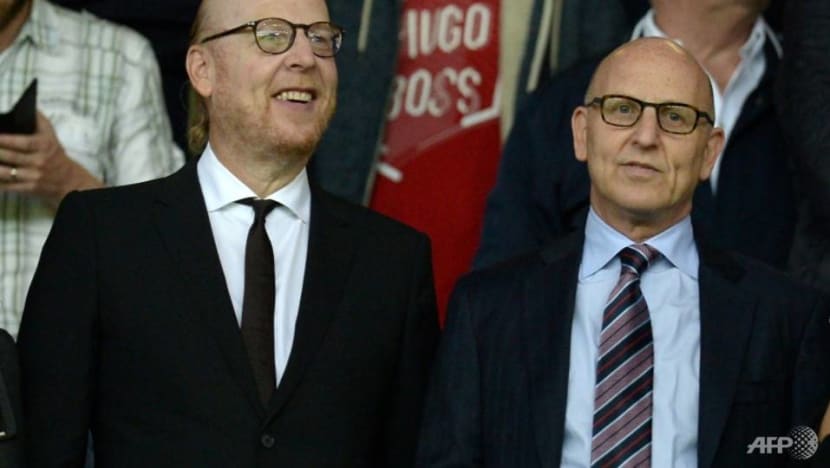
There have been protests from fans against owners before. United fans protested against the initial Glazer takeover in 2005 and Liverpool fans also did the same with their previous owners in 2009 but these were usually sporadic and uncoordinated.
It seems now however that the ESL has been the catalyst for a new activism by English fans and how they want their clubs to be organised and run.
WHAT’S NEXT?
The question is how this will manifest going forward.
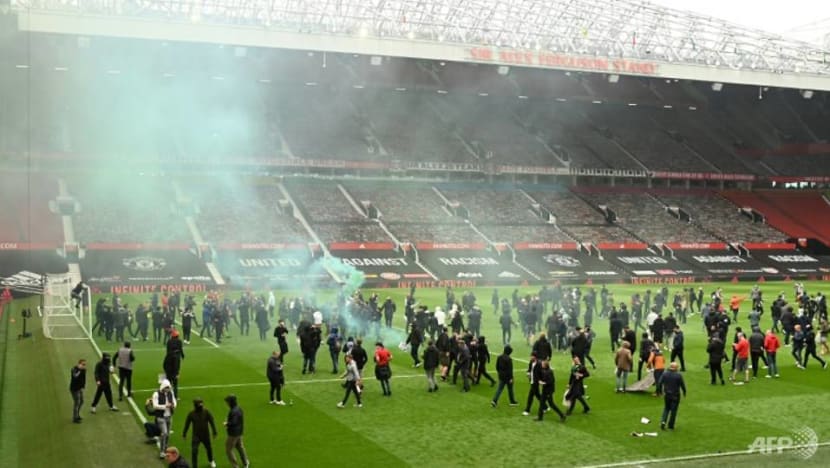
Yet finding the best way forward will not be easy. Forcing games to be postponed grabs headlines but is controversial and unlawful.
“We understand and respect the strength of feeling but condemn all acts of violence, criminal damage and trespass, especially given the associated COVID-19 breaches,” the EPL said in a statement. “Fans have many channels by which to make their views known, but the actions of a minority seen today have no justification.”
READ: Commentary: Could Sea Group’s Forrest Li be the next Singaporean owner of a global football club?
READ: Commentary: It is time social media played a more important role for football clubs
Hopefully the fans will not continue to protest and find other more lawful ways of making their voice heard. But if they do continue, is the movement going to be organised and united or chaotic and random? While the protests on Sunday seemed to be the latter, those involved have said that there was a plan to get the United-Liverpool game postponed.
If this is any indication, will there be efforts to do the same by other fans of the six EPL teams that wanted to breakaway to form the ESL when they play each other – like when Chelsea travels to Manchester City this Sunday (May 9) or when it hosts Arsenal on May 13?
But protests too have their limitations besides the obvious fact of disrupting law and order, and public safery, especially during a pandemic.
When the Glazer family initially took control of Manchester United, fans let their feelings known with protests at games so fierce that the family, who no longer attend matches, were forced to leave Old Trafford in police vans. Nothing changed.
It remains to be seen if the league punishes Manchester United for the events. If it does impose sanctions that could include docked points and fines, this could hurt the club’s owners more directly than postponed games. This would likely divide the fanbase as well.
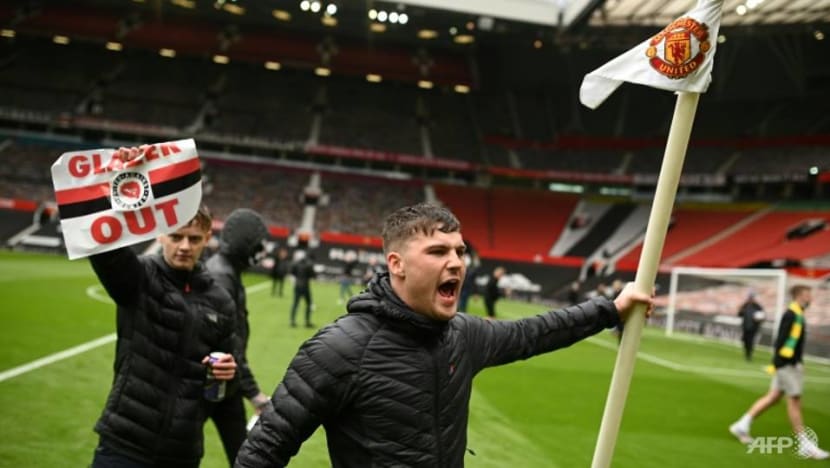
If forcing games to be cancelled is not a plausible tactic going forward, especially as the authorities may be more prepared to pre-empt and thwart protesters, then other options are limited.
Social media campaigns would have no effect on the Glazers. It is also unlikely that enough fans would agree to stop buying tickets, shelling out for shirts and paying monthly fees to broadcasters in order to reduce the club’s revenues and make it less attractive for the owners to remain.
Perhaps the best bet is to focus on the recent expression of government support to introduce legislation to change the ownership model in England, maybe along the so-called “50 plus one” model in Germany where private investors are limited to 49 per cent of a stake in clubs. It was noticeable that no German club signed up to the ESL.
As the reactions of Keane and Neville suggest, there is sympathy for fans after the recent actions of their owners. This could be the only time to force a change using the government route.
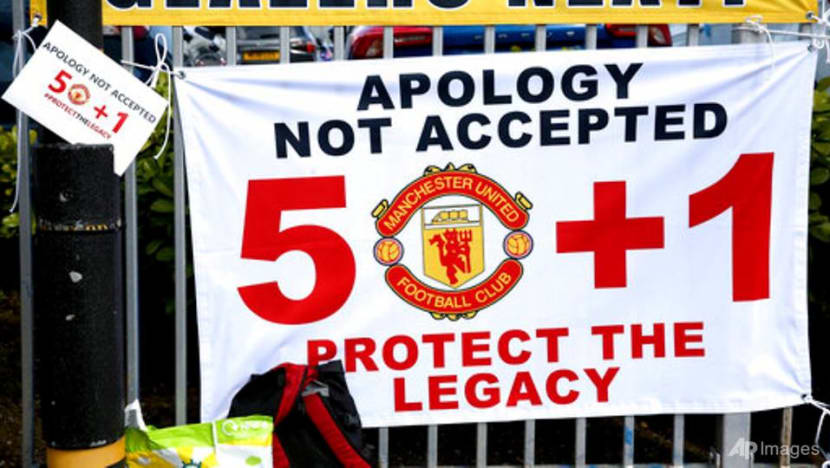
“This is our opportunity because the government allegedly is listening to us,” one Manchester United fan wrote in The Guardian. “But as I don’t think that will continue in the long term, we’ve got to seize this momentum and move forward with it.” He predicted more protests.
Oliver Dowden, the Secretary for Culture in the United Kingdom, said on Apr 21 that it was possible to consider legislation to curb the foreign ownership of football clubs and the Government would seriously look at the “German leagues (as) they have a different governance structure”.
READ: Commentary: Liverpool and Man Utd have a plan to save smaller English clubs. But no one is trusting them
Keeping pressure on the government may be the best way forward but fans face the tricky task of ensuring that momentum for change does not dissolve while ensuring that all fans and public opinion remain with them.
Cancelling a high-profile game may work once but it is not a tactic that should be used again. Fans may have just found their voices, but they will soon realise that using it has to be a judicious and carefully calculated decision.
John Duerden has lived in Asia for 20 years and covers the region’s sporting scene. He is the author of three books including Lions & Tigers - The History of Football in Singapore and Malaysia (2017).















